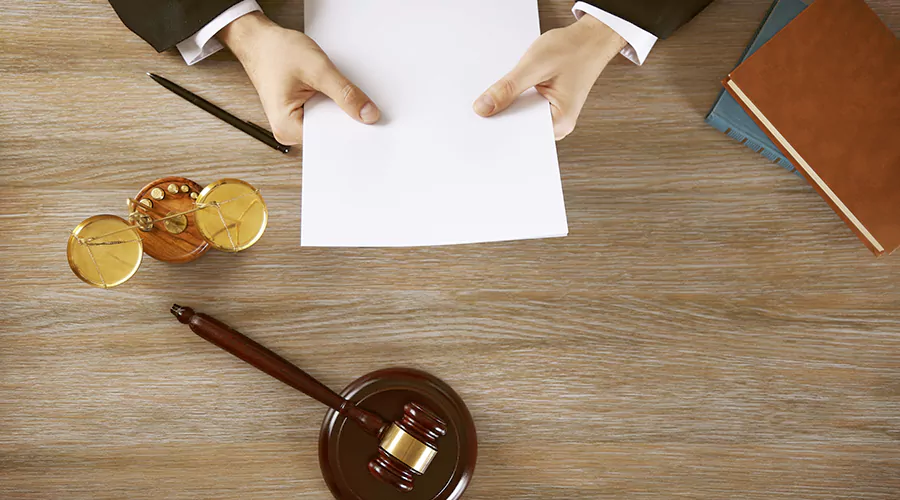
When it comes to defending yourself in court against an accusation, it feels quite a complex task. It’s even more overwhelming if you are unfamiliar with the legal process. Small claims courts are specially designed to solve small disputes. These courts also tend to be very affordable. However when you yourself are the defendant then the stakes are quite high. Whether you’re facing a claim for unpaid rent, a breach of contract, or alleged property damage. Knowing how to present your case in a better way is critical.
Such courts are different as compared to regular courts. The small claims court doesn't usually require attorneys. They are more informal. However this places a lot of burden on you to present your case effectively. While also gaining evidence and understanding the rules to defend yourself. As a small claims defendant, it is your duty to clearly respond to the plaintiff’s claim. The following guide covers all the necessary aspects which are required to know on defending a claim in the small claims court. Including filing a response, understanding jurisdiction, collecting evidence, and even appealing if the judgment doesn’t go in your favor, are all covered in the guide.
The great news to know is that if you have the correct preparation. As well as a good strategy, you can clearly present your side of the case. The following guide includes real-world case study to show how these strategies work in practice. By the end of this article, you will have the knowledge and tools to protect your rights and eventually win your case in a small claims court.
What is a Small Claims Court?
Small claims courts are special courts which are designed to handle cases with small monetary value. Each state and place has different limits ranging from $2,500 to $25,000. The cases are usually solved faster as compared to higher court cases. They also do not often require attorneys or legal representation.
- Common cases include:
- Disputes over unpaid bills or loans.
- Landlord-tenant disagreements.
- Breach of contract claims.
- Property damage or faulty services.
Why is Small Claims Court Important?
Small claims courts are very crucial in society. They provide a platform which is affordable and efficient. Through this we can resolve cases without the complex process of higher courts. However, if you are unprepared to present your case, then this can lead to a default judgment against you. This often means the court favors the opposing party. Clearly understanding the process will ensure that you defend yourself in court effectively.
Understanding Your Role as a Defendant
As a defendant in small claims court, it is your responsibility to respond to the plaintiff’s claim. As well as proving your side of the story. You have the rights to:
- Dispute the plaintiff’s claims
- Present evidence and witnesses.
- File a small claims court counterclaim if necessary.
- Appeal a decision if you lose the case (in most jurisdictions).

Common Reasons for Small Claims Court Cases against Defendants
When preparing to protect yourself in court, you should firstly know why you’ve been sued in the first place. This is an extremely crucial step. Common reasons include:
- Non-Payment of Debt: Creditors or lenders may sue for unpaid loans or bills.
- Contract Disputes: Breaches of terms in agreements for services or goods.
- Landlord-Tenant Issues: Unpaid rent or disputes over security deposits.
- Damage Claims: Claims for property damage caused by the defendant.
Step-by-Step Guide to Defending a Small Claims Court Case
1. Review the Summons and Complaint
- Carefully read the plaintiff’s claim and order to defendant SC-100
- Note the court date, time, and location.
- Identify the specific claims made by the plaintiff and the amount they are requesting.
2. Filing an Answer in Small Claims Court
File your response by the deadline stated in the summons. Missing this deadline can lead to a default judgment. Clearly address each claim made by the plaintiff. You should provide facts and evidence. If applicable, file a small claims court counterclaim. That is if you believe the plaintiff owes you money.
3. Understand Small Claims Court Jurisdiction
If you are an out-of-state defendant, ensure the court has jurisdiction over you. Improper service of documents or filing in the wrong jurisdiction, can be grounds for dismissal.
4. Gather Evidence to Support Your Defense
Evidence is crucial to winning your case. Prepare the following:
- Contracts and Agreements: Written proof of the relationship or transaction.
- Receipts and Invoices: Evidence of payments made or services provided.
- Photographs or Videos: Visual proof that supports your defense.
- Emails and Texts: Communication that disputes the plaintiff’s claims.
- Witness Statements: Testimonies from individuals with firsthand knowledge.
5. Use Witnesses Effectively
Witnesses can strengthen your case. Especially if they have direct knowledge of the dispute.
For example:
A contractor might call a subcontractor to verify completed work.
A landlord might call a property manager to confirm the condition of a rental property.
6. Explore Settlement Options
Settlements outside the court can save our time and incomes. You must consider negotiating with the plaintiff to solve the claim issues out of the court. The only thing that you must care about is to get the documents and agreements by both parties.
7. Preparing for Your Small Claims Court Hearing
Organize Your Evidence
Present your proof in a strong and logical order. Use labeled files to make it easy to find papers during the court hearing.
Practice Your Presentation
Your case presentation must be perfect, it will explain your side of the case. Collect strong facts and avoid emotional arguments. Time your presentation to confirm it fits within the court’s assigned time.
Understand Courtroom Etiquette
- Dress professionally to show respect for the court.
- Address the judge as “Your Honor.”
- Be civil to the plaintiff, court staff, and judge.
8. What to Expect During the Hearing
Opening Statements
The plaintiff presents their case first. In this they explain why they believe you owe them money or may have caused damages.
Take notes to address inaccuracies in their claims later.
Presenting Your Defense
- Present your evidence systematically.
- Highlight any inconsistencies in the plaintiff’s claims.
- Use witness testimony to strengthen your argument.
Cross-Examination
Politely question the plaintiff or their witnesses to challenge their claims or credibility.
Judge’s Decision
The judge may make a decision immediately. Or they might take some time to review the case before issuing a ruling.

What Happens If You Lose?
If the judgment is not in your favor, you can:
Appeal the Decision:Check your state’s rules for appeals. Deadlines for filing are typically short (10–30 days). So you should make sure to appeal before the deadline hits.
Negotiate Payment Terms:If you owe money, discuss a payment plan with the plaintiff to avoid further legal action.
Case Study: A Successful Small Claims Defense
The Case:
A woman named Sarah was a dog trainer. She was sued by her client, Mark, for accurately $1,000. According to Mark, Sarah was not able to train his dog as she had promised. Sarah, on the other hand, had proof that Mark did not comply in following the training guidelines that she provided.
Sarah’s Steps:
Reviewed the Complaint: Sarah carefully read Mark’s plaintiff’s claim and order to defendant SC-100, noting that Mark failed to mention his non-compliance.
Filed a Response: Sarah filed an answer disputing the claim and attached documentation
Prepared Evidence:- A signed contract outlining Mark’s responsibilities during training.
- Emails and texts where Sarah reminded Mark to follow the training steps.
- Video evidence of the dog successfully performing trained behaviors.
Sarah calmly explained her process. She emphasized that Mark’s lack of compliance led to the issues. She presented evidence and called a witness (a fellow trainer) to verify her methods.
Outcome:The judge ruled in Sarah’s favor, stating that Mark’s failure to follow instructions invalidated his claim.
- Common Mistakes to Avoid in Small Claims Court
- Ignoring the Summons: This leads to an automatic loss through default judgment.
- Lack of Preparation: Disorganized evidence can weaken your case.
- Emotional Arguments: Stick to facts and avoid personal attacks.
- Missing Deadlines: Always file responses and appeals on time.
Additional Considerations
Defending Out-of-State Cases: In the case that you are a small claims out-of-state defendant. You must ensure the court has proper jurisdiction. Other than that you should also make sure that you were served correctly. This can be grounds for dismissal.
Improper Service: If the Small Claims Court cannot find the defendant. Or failing to serve documents correctly, you may challenge the validity of the case.
Filing a Counterclaim: Filing a small claims court counterclaim can turn the tables. This can force the plaintiff to address your grievances.

Conclusion:
When you are defending a small claims court case, you must ensure that you are prepared well. Other than that you should be well organized and confident. By clearly identifying and understanding the plaintiff’s claims, gathering strong evidence, and presenting your case in a professional manner. This can set grounds for your success. Whether you’re dealing with a local case or are an out-of-state defendant, the strategies outlined in this guide will help you to deal with the process effectively and achieve the best possible outcome, eventually leading to your victory.








